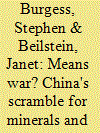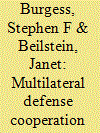| Srl | Item |
| 1 |
ID:
119252


|
|
|
|
|
| Publication |
2013.
|
| Summary/Abstract |
The tendency for rising powers to seek control of resource markets is being repeated in Southern Africa, where rising powers led by China are competing for strategic minerals. This could lead to market failure, shutting out Western companies. However, competition does not mean that armed conflict will occur. The global reach of the United States is such that it can take measures short of war to guarantee the flow of minerals. China will be at a strategic disadvantage for some time in relation to the United States and cannot assert control over the flow of minerals. The Southern Africa case shows that even in the era of globalization, monopolization and nationalization of resources will still be attempted, but those efforts are likely to be countered by global forces in favour of free markets. Rising powers like China may temporarily monopolize resources found on their own territory, but strong global forces will ensure that the flow of most resources continues. Monopolization is unlikely to work outside the territory of rising powers, because they still must rely on sea lanes to transport those minerals. The United States still has the ultimate trump in its navy, which can stop the flow of resources to any would-be monopolist.
|
|
|
|
|
|
|
|
|
|
|
|
|
|
|
|
| 2 |
ID:
159150


|
|
|
|
|
| Summary/Abstract |
Some U.S. military leaders have asserted that the United States, Japan, Australia, and India and the Republic of Korea are developing multilateral defense cooperation to deter aggression and uphold norms much like North Atlantic Treaty Organization (NATO) has in Europe. Frequent military exercises and China’s threats to freedom of navigation (FoN) and North Korea’s nuclear missiles comprise the motive force for such cooperation. However, cooperation thus far has been trilateral and minimal, given divergent national interests and dispersed geopolitical locations. Cooperation among Japan, Republic of Korea (ROK), and the United States is increasing given the threat, but ROK’s public opinion is divided about Japan. Australia, Japan, and India have increased cooperation with the United States but are reluctant to conduct FoN operations with the United States to challenge China’s expansionism in the South China Sea. If China becomes more aggressive and blocks FoN or seizes territory, development toward an Asian NATO is possible.
|
|
|
|
|
|
|
|
|
|
|
|
|
|
|
|